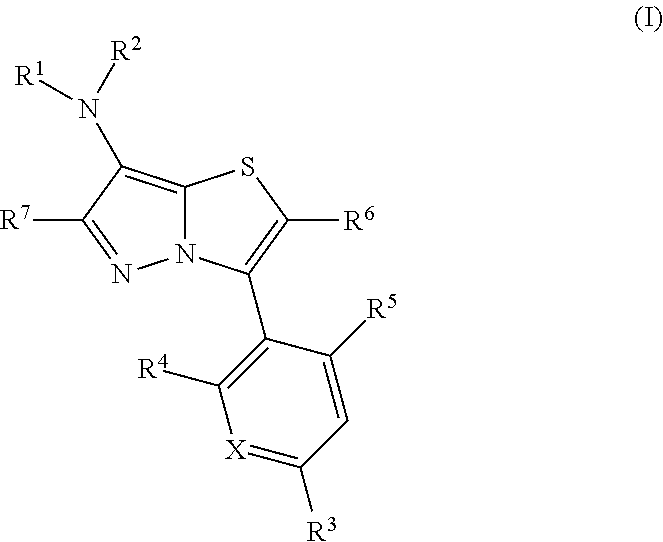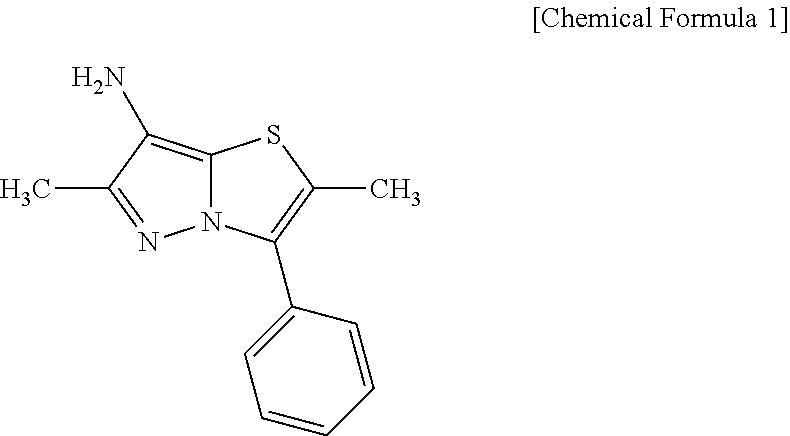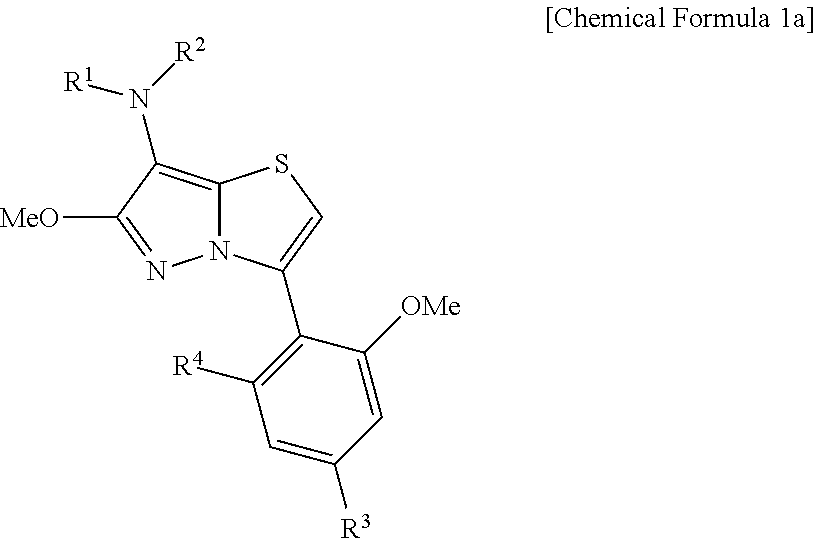Pyrazolothiazole compound
a technology of pyrazolothiazole and compound, which is applied in the field of compound, can solve the problems of not being able to have sufficient pharmacological activity, not necessarily sufficient in terms of superior crf receptor antagonism, etc., and achieve the effects of reducing depression, depressive symptoms, and anxiety
- Summary
- Abstract
- Description
- Claims
- Application Information
AI Technical Summary
Benefits of technology
Problems solved by technology
Method used
Image
Examples
production example 1
Dihydro-2H-pyran-3(4H)-one
[0459]
[0460]To a mixture of oxalyl chloride (2.28 mL, 26.6 mmol) and dichloromethane (40 mL) was added a mixture of DMSO (3.78 mL, 53.2 mmol) and dichloromethane (20 mL) while stirring at −78° C., and the mixture was stirred at −78° C. for 30 minutes. After then adding to this mixture a mixture of tetrahydropyran-3-ol (synthesized according to the method described in Tetrahedron, 60, 10411-10418, 2004) (136 g, 13.3 mmol) and dichloromethane (20 mL) at −78° C., the resulting mixture was stirred at −78° C. for 30 minutes, after which triethylamine (11.1 mL, 79.8 mmol) was added and stirring was continued for 2 hours while slowly raising the temperature to 0° C.
[0461]Brine and diethyl ether were added to the mixture, and after sufficient shaking, the organic layer was separated and the organic layer was washed with brine and dried over anhydrous magnesium sulfate. The mixture was then filtered, and the solvent in the filtrate was distilled off under reduced pr...
production example 2
2-Cyclopropylethyl methanesulfonate
[0463]
[0464]To a mixture of 2-cyclopropylethanol (5.35 g, 62.1 mmol) and dichloromethane (107 mL) were added methanesulfonyl chloride (5.29 mL, 68.3 mmol) and triethylamine (13.1 mL, 93.1 mmol) in that order while stirring on ice, and the resulting mixture was stirred for 1 hour. Water and ethyl acetate were then added to the reaction mixture. After thoroughly shaking the mixture, the organic layer was separated and the organic layer was washed with brine and dried over anhydrous magnesium sulfate. The mixture was then filtered, and the solvent in the filtrate was distilled off under reduced pressure to obtain the title compound (10.3 g, 62.7 mmol).
[0465]1H-NMR (CDCl3) δ: 0.10-0.16 (m, 2H), 0.48-0.55 (m, 2H), 0.72-0.83 (m, 1H), 1.65 (q, J=6.8 Hz, 2H), 3.01 (s, 3H), 4.29 (t, J=6.8 Hz, 2H).
production example 3
[0466]Tetrahydrofuran-3-yl-4-methylbenzenesulfonate
[0467]
[0468]To a mixture of 3-hydroxytetrahydrofuran (7.00 g, 79.5 mmol) and pyridine (100 mL), was added p-toluenesulfonyl chloride (18.2 g, 95.4 mmol) while stirring at room temperature, and the resulting mixture was stirred for 8.5 hours. To the mixture, were added water and ethyl acetate. After thoroughly shaking the mixture, the organic layer was separated, and the organic layer was washed with brine and dried over anhydrous magnesium sulfate. The mixture was filtered, and then the solvent in the filtrate was distilled off under reduced pressure. The residue was purified by silica gel column chromatography (a mixed solvent of n-heptane and ethyl acetate: n-heptane / ethyl acetate=4 / 1) to obtain the title compound (13.0 g, 53.7 mmol).
[0469]1H-NMR (CDCl3) δ: 2.08-2.11 (m, 2H), 2.46 (s, 3H), 3.78-3.91 (m, 4H), 5.09-5.13 (m, 1H), 7.35 (d, J=8.0 Hz, 2H), 7.78 (d, J=8.0 Hz, 2H).
PUM
| Property | Measurement | Unit |
|---|---|---|
| temperature | aaaaa | aaaaa |
| temperature | aaaaa | aaaaa |
| temperature | aaaaa | aaaaa |
Abstract
Description
Claims
Application Information
 Login to View More
Login to View More - R&D
- Intellectual Property
- Life Sciences
- Materials
- Tech Scout
- Unparalleled Data Quality
- Higher Quality Content
- 60% Fewer Hallucinations
Browse by: Latest US Patents, China's latest patents, Technical Efficacy Thesaurus, Application Domain, Technology Topic, Popular Technical Reports.
© 2025 PatSnap. All rights reserved.Legal|Privacy policy|Modern Slavery Act Transparency Statement|Sitemap|About US| Contact US: help@patsnap.com



